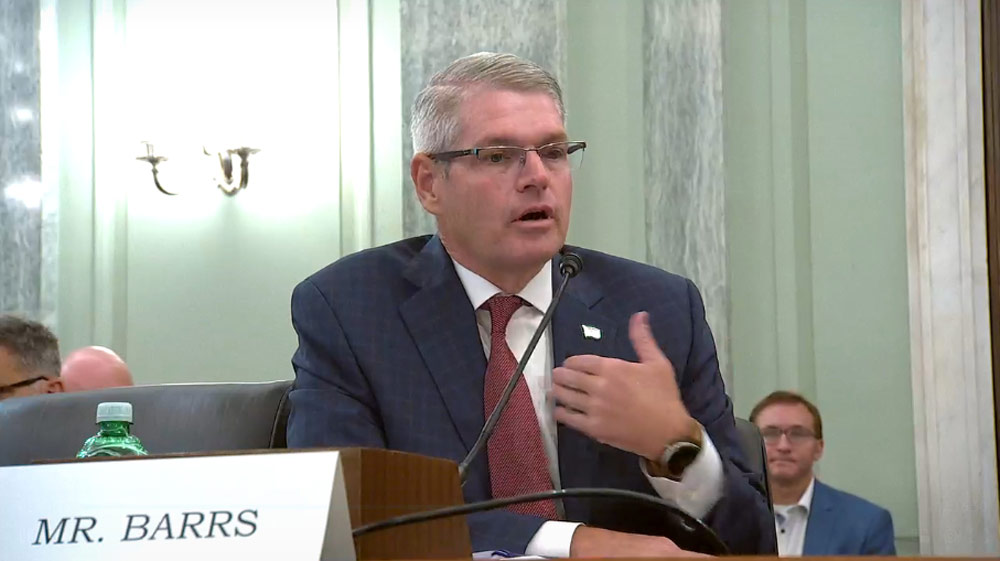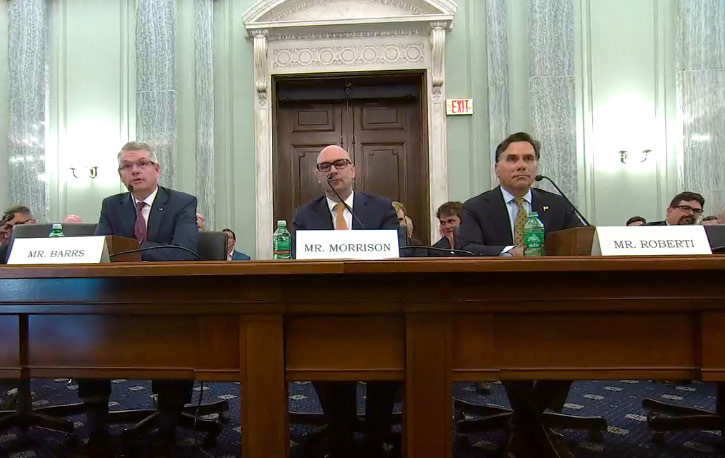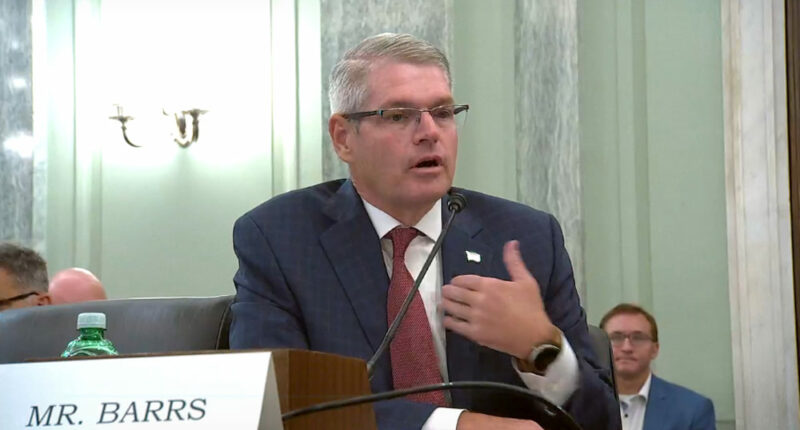
Navigating a few ideologically choppy waters as senators dueled over deregulation and political interference, Flagler County School Board member Derek Barrs on Wednesday cleared the main hurdle to his presidential nomination to lead the Transportation Department’s Federal Motor Carrier Safety Administration as he appeared for a nomination hearing before the U.S. Senate Transportation Committee.
He sat alongside two nominees for other posts. President Trump nominated Barrs to the post in March. He nominated Paul Roberti for Administrator of the Pipeline and Hazardous Materials Safety Administration, and Paul Morrison for Administrator of the National Highway Traffic Safety Administration. All three sat facing the committee members for the 130-minute hearing.
The hearing, chaired by U.S. Sen. Ted Cruz, the Texas Republican, was uneventful but for the usual grandstanding by committee members, who at times spoke longer than the nominees (Sen. Bernie Moreno, the Ohio Republican who wants to sharply deregulate the auto industry, and Sen. Ben Lujan, the New Mexico Democrat, were especially egregious in that regard.) It allowed Barrs, who was well prepared, to show his command of truck safety issues in general while conveying his human side as a person overly familiar with the crash scenes and their consequences. He steered clear of specifics and at times sidestepped thornier questions, as when he was asked what he would do if his inspectors got political pressure to go light on enforcement.
The committee is expected to vote on the nominations by the end of the month. A full Senate vote will follow, though when is unclear. That’s to the advantage of the School Board, where Barrs will remain until his Senate confirmation.
“It was honor and a privilege,” Barrs said today of the hearing in a text to FlaglerLive. “I want to thank my family, friends, colleagues, the many safety and advocacy organizations, and my community who have supported me on this journey to serve in this critical safety role.“
Sen. Rick Scott introduced Barrs as a fourth generation Floridian and father of two who spent 30 years in law enforcement, from the Madison County Sheriff’s Office to the Florida Highway Patrol, from where he retired–not quite as “Chief of the Florida Highway Patrol,” as Scott said, but as chief of its Office of Commercial Vehicle Enforcement.
Scott spoke of knowing Barrs for several years and with him touring Quincy, the small town north of Tallahassee, after Hurricane Michael in 2018, a Category 5 hurricane at landfall. “Chief Barrs showed then and now his dedication to improve in the lives and safety of those around him,” Scott said. “He is a proven leader and problem solver who works to understand both people and the issues they face.”
The senator did not mention Barrs’s service on the School Board. Barrs did, cleverly weaving the reference into the context of the hearing’s purpose: “Today, I remain committed to serving my community through my appointment to the Flagler County School Board,” he said–probably the first time in history that the school board got a mention in the transportation committee’s hearing room–“where we operate a successful commercial vehicle driver training school, contributing to workforce development and helping prepare the next generation of safe and professional drivers.”
That was a plug for the Flagler Technical Institute. Barrs then spoke familiarly to those who know his humane side: “I have witnessed the devastating aftermath of crashes, stood beside first responders, comforted grieving families and seeing how a single moment can ripple through an entire community,” he told the committee. “In 2023 approximately 5,000 lives were lost in large truck and bus crashes, including 900 commercial drivers. These are not just statistics. They are parents, children, colleagues and friends. Every life lost is one too many. No one should have to see the horrific aftermath of a crash like what I and so many first responders have seen. No family should have to endure that kind of loss. If confirmed, I will make roadways safe. Roadway safety my top priority.”
He spoke of his connections with industry associations and organizations that focus on truck safety.
His first question was from Cruz, who posed it–or rather read it: his staff had fed him the questions–with his usual prosecutorial tone. It was about Mexican truck drivers entering the country on “fraudulently issued Mexican CDLs,” meaning commercial driver’s licenses, jeopardizing safety. Cruz wanted to know if Barrs will work with him “to fix this problem.” Barrs said he would, as he did when Cruz asked him about “freight fraud.”
Cruz did not have follow-up questions, letting the softballs roll. He just moved on with questions to the other nominees, mixing polemics with facts (for example, blaming the Biden administration for “mountains of red tape”). He asked Morrison how the government could encourage the auto industry to build safe vehicles “without relying on costly government mandates that raise vehicle prices for consumers.” The question underscored the unresolved paradox at the heart of current GOP ideology–the claim that safety is paramount, but regulations to ensure safety are anathema.
Morrison had served as chief counsel at the National Highway Transportation and Safety Administration during Trump’s first term, did not address the question directly, explaining instead the mechanism already in play–the automatic recalls required when the federal agency triggers a safety defect, and the necessity of regulations of new technology.
Naturally, questions from Democrats on the committee were tougher. Sen. Maria Cantwell, the ranking Democrat, noted how a recent Government Accounting Office reported about aviation safety inspectors’ jobs being threatened if they enforced safety regulations too strongly.
“I want to know from you whether you believe that you are going to protect these inspectors from that kind of retaliation,” Cantwell asked Barrs. “Will you commit to being a strong policeman on the beat and making sure there’s no political interference at your agencies on those inspectors?”
“It is extremely important to me that we make sure that we do that, and we work together collaboratively with them and give them the tools in the toolbox that they need to address these issues that you’re referring to,” Barrs said. He did not address the heart of the question: political interference, which has been rife in the current administration.
“So no political retaliation?” Cantwell pressed.
Barrs sidestepped. “Senator, I’m looking forward to working with them and making sure that they’re able to do their job, and I think that’s what’s important,” he said.
Roberti, the nominee for the pipeline safety post, was more direct: “From my experience working with the fantastic investigators, both in the Office of Vehicle Safety Compliance and the Office of Defects Investigation, you really need a robust, honest back and forth relationship with them,” he said. “We need the data. We need to analyze the data to determine whether or not there might be a defect or non-compliance, and so ensuring the level of trust is critical.”
“And making sure they’re not harassed by somebody?” Cantwell asked.
“Absolutely.”
On it went. Sen. Marsha Blackburn, the Tennessee Republican, wanted Barrs to help prohibit truck drivers who can’t speak English from holding CDLs–again, a swipe at migrants, Mexicans especially (the inability to speak English having little to do with the ability to read road signs and rules of the road).
Barrs agreed with Blackburn. “It’s extremely important that that driver is able to at least have a conversation, understand the commands and understand our road signs for safety,” Barrs said. “It is safety first.”
Sen. Ben Lujan, the New Mexico Democrat, took the direct route as he showed his exasperation with the hymns to deregulation in the room. “Here’s a thought, Mr. Morrison,” he said, “why don’t you just eliminate seat belts from cars, eliminate backup cameras from cars, hell, stop making them out of metal. Make them out of plastic, and let’s find the cheapest car that we can sell to the American people.”
He spoke of being in a crash caused by a driver who was “drunker than shit,” and was incensed about self-driving cabs. “That’s safe?” he cried, wondering why American carmakers weren’t installing technology available in Europe to prevent impaired driving. To Barrs, he asked what the nominee would do to reduce truck crashes, which have been increasing in New Mexico. Barrs said “aggressive law enforcement” and “routine road inspections” before crashes happen are vital.
“I just hope we can find some common ground on public safety,” Lujan continued, as if he’d not heard Barrs. “I heard like my colleagues say that’s something Democrats and Republicans agree on. Do we or don’t we? It’s time to put up or shut up when we get these rules in place, and we either choose to save the American people, or we’re not.”
![]()










